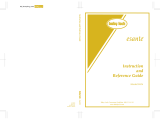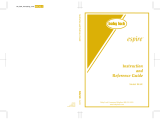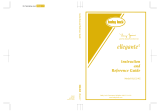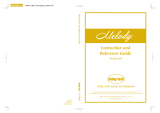
Contents
6
CONTENTS
NAMES OF MACHINE PARTS AND THEIR
FUNCTIONS ...........................................................9
Machine ..................................................................... 9
Needle and Presser Foot Section............................... 10
Embroidery Unit ....................................................... 10
Operation Buttons .................................................... 11
Included Accessories ................................................ 11
Options .................................................................... 14
Chapter 1 Getting Ready 15
TURNING THE MACHINE ON/OFF ....................16
LCD SCREEN .......................................................17
Using the Machine Setting Mode Key ...................... 20
Using the Machine Operation Mode Key ................. 22
Using the Pattern Explanation Key ........................... 23
LOWER/UPPER THREADING ..............................24
Winding the Bobbin ................................................. 24
Setting the Bobbin .................................................... 27
Pulling Up the Bobbin Thread .................................. 27
Upper Threading ...................................................... 28
Using the Twin Needle............................................. 31
CHANGING THE PRESSER FOOT .......................33
Removing the Presser Foot........................................ 33
Attaching the Presser Foot......................................... 33
CHANGING THE NEEDLE...................................34
Chapter 2 Sewing Basics 37
SEWING ..............................................................38
Sewing a Stitch ......................................................... 38
Sewing Reinforcement Stitches ................................. 40
Sewing Curves .......................................................... 40
Changing Sewing Direction ...................................... 40
Sewing Heavyweight Fabric...................................... 41
Sewing Lightweight Fabric........................................ 41
ADJUSTING STITCH SETTINGS...........................42
Adjusting the Stitch Width ........................................ 42
Adjusting the Stitch Length ....................................... 42
Adjusting the Thread Tension ................................... 43
USEFUL FUNCTIONS..........................................43
Automatic Reinforcement Stitching........................... 43
Automatic Thread Cutting......................................... 44
Locking the Screen ................................................... 45
Chapter 3 Utility Stitches 47
SELECTING A UTILITY STITCH............................48
Selecting a Stitch Pattern........................................... 49
Saving Stitch Settings ................................................ 49
Using the Sewing Type Selection Key ...................... 50
SEWING THE STITCHES ......................................51
Straight Stitches ........................................................ 51
Darts Seams.............................................................. 53
Gathering ................................................................. 54
Flat Fell Seams.......................................................... 54
Pintucks.................................................................... 55
Zigzag Stitches.......................................................... 56
Elastic Zigzag Stitches............................................... 57
Overcasting .............................................................. 58
Quilting .................................................................... 62
Blind Hem Stitches ................................................... 66
Appliqués ................................................................. 67
Shell Tuck Stitching .................................................. 68
Scalloping................................................................. 68
Top Stitching ............................................................ 69
Smocking.................................................................. 69
Fagoting.................................................................... 70
Tape or Elastic Attaching........................................... 71
Heirloom Stitching.................................................... 72
Buttonhole Stitches ................................................... 74
Bar Tacks.................................................................. 79
Button Sewing........................................................... 81
Eyelets ...................................................................... 82
Multi-Directional Sewing (Straight Stitch and
Zigzag Stitch)............................................................ 83
Zipper Insertion ........................................................ 84
Chapter 4 Character/Decorative Stitches 87
SELECTING STITCH PATTERNS .......................... 88
Selecting Decorative Stitch Patterns/7 mm
Decorative Stitch Patterns/Satin Stitch Patterns/
7 mm Satin Stitch Patterns/Cross Stitch Patterns/
Utility Decorative Stitch Patterns............................... 89
Alphabet Patterns...................................................... 89
SEWING STITCH PATTERNS............................... 91
Sewing Attractive Finishes......................................... 91
Basic Sewing............................................................. 91
Adjusting Patterns ..................................................... 92
EDITING STITCH PATTERNS .............................. 94
Changing the Pattern Size ......................................... 95
Changing the Pattern Length
(7 mm Satin Stitch Patterns Only).............................. 95
Creating a Vertical Mirror Image............................... 95
Creating a Horizontal Mirror Image .......................... 95
Selecting a Single/Repeating Pattern.......................... 96
Changing the Thread Density
(Satin Stitch Patterns Only)........................................ 96
COMBINING STITCH PATTERNS ....................... 97
Before Combining Patterns........................................ 97
Combining Patterns From Different Categories.......... 97
Combining Stitch Patterns of Different Sizes.............. 98
Combining Stitch Patterns of Different Orientations .. 99
Combining Stitch Patterns of Different Lengths........ 100
Creating Step Patterns (7 mm Satin Stitch Patterns
Only) ...................................................................... 101
USING THE MEMORY FUNCTION................... 103
Stitch Data Precautions........................................... 103
Saving Stitch Patterns in the Machine’s Memory ..... 103
Saving Stitch Patterns to the Computer.................... 105
Retrieving Stitch Patterns from the Machine’s
Memory.................................................................. 106
Retrieving Stitch Patterns from the Computer .......... 107
Chapter 5 Embroidery 109
BEFORE EMBROIDERING................................. 110
Attaching Embroidery Foot “U”............................... 111
Attaching the Embroidery Unit................................ 112
SELECTING EMBROIDERY PATTERNS.............. 114
One-point Patterns/Floral Patterns........................... 115
Alphabet Patterns.................................................... 116
Frame Patterns ........................................................ 117
Embroidery Cards ................................................... 118
Selecting Patterns from the Machine's Memory/
Computer................................................................ 118
VIEWING THE SEWING SCREEN...................... 119
PREPARING THE FABRIC.................................. 120
Attaching Stabilizer to Fabric .................................. 120
Hooping Fabric in the Embroidery Frame................ 121


























